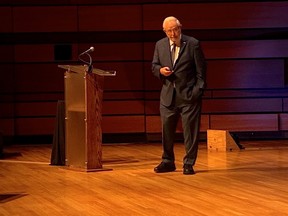Science
Queen’s University Celebrates McDonald’s Nobel Legacy with New Funding

Queen’s University recently marked the tenth anniversary of Professor Emeritus Art McDonald receiving the Nobel Prize in Physics. This milestone not only celebrated past achievements but also paved the way for future advancements in the field of particle physics. A gathering of distinguished scientists took place on Friday in Kingston, Ontario, where the significance of McDonald’s contributions and the bright prospects ahead were highlighted.
In a significant boost to research funding, the Canadian government announced $45.5 million in federal support over the next five years for the Arthur B. McDonald Canadian Astroparticle Physics Research Institute. McDonald emphasized the importance of this investment, saying, “Canada has made a choice that this is an area that Canada can be a world expert in.” He noted that the scope of particle physics research in Canada has expanded significantly since the inception of work at SNOLAB in Sudbury, making the country a global leader in this innovative field.
The research conducted at SNOLAB focuses on astroparticle physics, which involves studying cosmic particles to unlock secrets of the universe, including insights into conditions following the Big Bang. McDonald remarked, “We are contributing significantly to that exercise of attempting to fill out the unknown parts of that theory.” He also pointed out that SNOLAB is one of the world’s two lowest radioactivity locations, attracting researchers from around the globe for experiments.
This new funding will enable the McDonald Institute and partner universities to bolster their teams by hiring additional researchers across Canada. Patrick Dean, the principal of Queen’s University, expressed optimism about the future, stating, “This is the kind of moment that reminds us not only of past triumph but also of the limitless potential that lies ahead when vision, collaboration, and support come together, particularly in the field of research.”
Alejandro Adem, president of the Natural Sciences and Engineering Research Council of Canada (NSERC), echoed this sentiment, noting Canada’s proud tradition in physics, a discipline central to understanding humanity and the universe.
Even prior to the Nobel Prize win, SNOLAB had fostered a collaborative network of physicists across nearly two dozen universities and institutes, all aiming to answer fundamental questions about the universe. Despite the progress made, challenges remain. Tony Noble, scientific director at the McDonald Institute, highlighted the ongoing mysteries physicists face, stating, “When we look out at the universe, we understand everything in terms of how the galaxy is formed…yet 85 percent of the matter in the universe, we have no idea what it is.”
Noble further emphasized the enigma of why the universe is composed of matter rather than antimatter, calling it a conundrum that “makes you wonder a little bit.” He added, “What we can see we understand exquisitely well. We don’t know what it is that we can’t see.”
Students at Queen’s, including third-year undergraduate Julia Brachman, are poised to contribute to this evolving narrative. Reflecting on the impact of McDonald’s Nobel win, Brachman shared, “When the Nobel Prize was won 10 years ago, I was 10 years old in elementary school… Art McDonald came to visit and shared about his research… that was so influential and very much motivated me to not only study at Queen’s but study physics and astrophysics.”
PhD student Zoe Brisson-Tsavoussis highlighted the institute’s competitive edge in dark matter research and the collaborative spirit that drives their work. “We’re extraordinarily competitive in dark matter research,” she said, adding, “I’m most interested in neutrinos… They are one of the most informative particles that we have, and they’re also the misfits.”
As Queen’s University continues to build on its legacy of scientific inquiry, the future of particle physics in Canada looks promising, driven by collaboration and a commitment to exploration.
-

 Science2 months ago
Science2 months agoToyoake City Proposes Daily Two-Hour Smartphone Use Limit
-

 Health2 months ago
Health2 months agoB.C. Review Reveals Urgent Need for Rare-Disease Drug Reforms
-

 Top Stories2 months ago
Top Stories2 months agoPedestrian Fatally Injured in Esquimalt Collision on August 14
-

 Technology2 months ago
Technology2 months agoDark Adventure Game “Bye Sweet Carole” Set for October Release
-

 World2 months ago
World2 months agoJimmy Lai’s Defense Challenges Charges Under National Security Law
-

 Technology2 months ago
Technology2 months agoKonami Revives Iconic Metal Gear Solid Delta Ahead of Release
-

 Technology2 months ago
Technology2 months agoSnapmaker U1 Color 3D Printer Redefines Speed and Sustainability
-

 Technology2 months ago
Technology2 months agoSolve Today’s Wordle Challenge: Hints and Answer for August 19
-

 Technology2 months ago
Technology2 months agoAION Folding Knife: Redefining EDC Design with Premium Materials
-

 Business2 months ago
Business2 months agoGordon Murray Automotive Unveils S1 LM and Le Mans GTR at Monterey
-

 Lifestyle2 months ago
Lifestyle2 months agoVictoria’s Pop-Up Shop Shines Light on B.C.’s Wolf Cull
-

 Technology2 months ago
Technology2 months agoApple Expands Self-Service Repair Program to Canada









